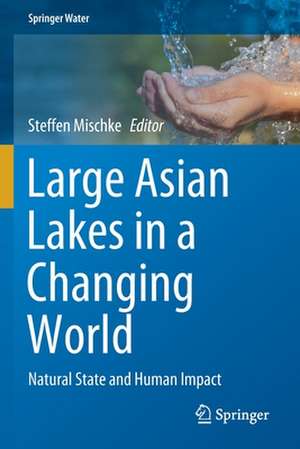Large Asian Lakes in a Changing World: Natural State and Human Impact: Springer Water
Editat de Steffen Mischkeen Limba Engleză Paperback – 12 mai 2021
| Toate formatele și edițiile | Preț | Express |
|---|---|---|
| Paperback (1) | 943.57 lei 6-8 săpt. | |
| Springer International Publishing – 12 mai 2021 | 943.57 lei 6-8 săpt. | |
| Hardback (1) | 949.55 lei 6-8 săpt. | |
| Springer International Publishing – 12 mai 2020 | 949.55 lei 6-8 săpt. |
Din seria Springer Water
- 18%
 Preț: 896.08 lei
Preț: 896.08 lei - 18%
 Preț: 956.03 lei
Preț: 956.03 lei - 24%
 Preț: 2377.21 lei
Preț: 2377.21 lei - 15%
 Preț: 653.14 lei
Preț: 653.14 lei -
 Preț: 361.56 lei
Preț: 361.56 lei - 18%
 Preț: 1877.02 lei
Preț: 1877.02 lei - 18%
 Preț: 1113.09 lei
Preț: 1113.09 lei - 18%
 Preț: 915.79 lei
Preț: 915.79 lei - 15%
 Preț: 659.70 lei
Preț: 659.70 lei - 15%
 Preț: 649.71 lei
Preț: 649.71 lei - 15%
 Preț: 648.42 lei
Preț: 648.42 lei - 15%
 Preț: 652.49 lei
Preț: 652.49 lei - 18%
 Preț: 960.78 lei
Preț: 960.78 lei - 18%
 Preț: 787.78 lei
Preț: 787.78 lei -
 Preț: 391.99 lei
Preț: 391.99 lei - 18%
 Preț: 949.55 lei
Preț: 949.55 lei - 18%
 Preț: 1005.29 lei
Preț: 1005.29 lei - 15%
 Preț: 646.75 lei
Preț: 646.75 lei - 15%
 Preț: 649.22 lei
Preț: 649.22 lei - 15%
 Preț: 648.05 lei
Preț: 648.05 lei - 18%
 Preț: 791.71 lei
Preț: 791.71 lei - 15%
 Preț: 646.43 lei
Preț: 646.43 lei - 18%
 Preț: 903.17 lei
Preț: 903.17 lei - 18%
 Preț: 1234.77 lei
Preț: 1234.77 lei - 15%
 Preț: 649.06 lei
Preț: 649.06 lei - 15%
 Preț: 661.97 lei
Preț: 661.97 lei - 18%
 Preț: 974.04 lei
Preț: 974.04 lei - 15%
 Preț: 650.86 lei
Preț: 650.86 lei - 18%
 Preț: 977.80 lei
Preț: 977.80 lei - 15%
 Preț: 665.08 lei
Preț: 665.08 lei - 18%
 Preț: 948.79 lei
Preț: 948.79 lei - 18%
 Preț: 952.72 lei
Preț: 952.72 lei - 24%
 Preț: 698.86 lei
Preț: 698.86 lei - 15%
 Preț: 647.73 lei
Preț: 647.73 lei - 15%
 Preț: 638.76 lei
Preț: 638.76 lei - 18%
 Preț: 785.42 lei
Preț: 785.42 lei - 15%
 Preț: 645.28 lei
Preț: 645.28 lei - 15%
 Preț: 640.88 lei
Preț: 640.88 lei
Preț: 943.57 lei
Preț vechi: 1150.70 lei
-18% Nou
Puncte Express: 1415
Preț estimativ în valută:
180.55€ • 196.74$ • 152.14£
180.55€ • 196.74$ • 152.14£
Carte tipărită la comandă
Livrare economică 23 aprilie-07 mai
Preluare comenzi: 021 569.72.76
Specificații
ISBN-13: 9783030422561
ISBN-10: 3030422569
Ilustrații: IX, 264 p. 59 illus., 49 illus. in color.
Dimensiuni: 155 x 235 mm
Greutate: 0.39 kg
Ediția:1st ed. 2020
Editura: Springer International Publishing
Colecția Springer
Seria Springer Water
Locul publicării:Cham, Switzerland
ISBN-10: 3030422569
Ilustrații: IX, 264 p. 59 illus., 49 illus. in color.
Dimensiuni: 155 x 235 mm
Greutate: 0.39 kg
Ediția:1st ed. 2020
Editura: Springer International Publishing
Colecția Springer
Seria Springer Water
Locul publicării:Cham, Switzerland
Cuprins
The Dead Sea and Its Deviation from Natural Conditions.- Lake Sevan: Evolution, Biotic Variability and Ecological Degradation.- Past and Current Changes in the Largest Lake of the World: The Caspian Sea.- The Aral Sea: A Story of Devastation and Partial Recovery of a Large Lake.- Geological History and Present Conditions of Lake Balkhash.- Lake Issyk-Kul: Its History and Present State.- Lop Nur in NW China: Its Natural State, and a Long history of Human Impact.- Uvs Nuur: A Sentinel for Climate Change in Eastern Central Asia.
Recenzii
Notă biografică
Textul de pe ultima copertă
Describing the natural state of eight important lakes in Asia and the human impact on these lake ecosystems, this book offers a valuable reference guide. Over the past several decades the Aral Sea, Dead Sea, Lake Balkhash and other major lakes in Asia have undergone significant changes with regard to their size, water level, chemical composition, and flora and fauna. Most of these changes resulted from the loss of water from tributaries (now used for irrigation farming) or increasing consumption in local industries and households. However, significant human impacts may have begun as early as 2000 years ago. In addition to the three lakes mentioned above, Lake Sevan (Armenia), the Caspian Sea (Azerbaijan, Iran, Kazakhstan, Russia, Turkmenistan), Lake Issyk-Kul (Kyrgyzstan), and Lake Lop Nur (China) are discussed as the most prominent examples of changing lake ecosystems. In contrast, an example of an almost pristine lake ecosystem is included with the report on Lake Uvs Nuur (Mongolia).
For each lake, the book summarizes its origin and early geological history, and reconstructs its natural state and variability on the basis of proxy records from drilled or exposed lake sediments that have accumulated since the last ice age. The frequently observed reductions in lake level and size during most recent decades led often to significant environmental impacts in the respective lake catchments including vegetation deterioration, soil erosion and badland formation, soil salinization or the formation of sinkholes.
Caracteristici
Offers a valuable reference guide, describing the natural state of important lakes in Asia Provides a unique overview of human impacts on eight important lakes in Asia Reveals that Asian lakes have most likely experienced the most severe ecosystem changes triggered by humans
